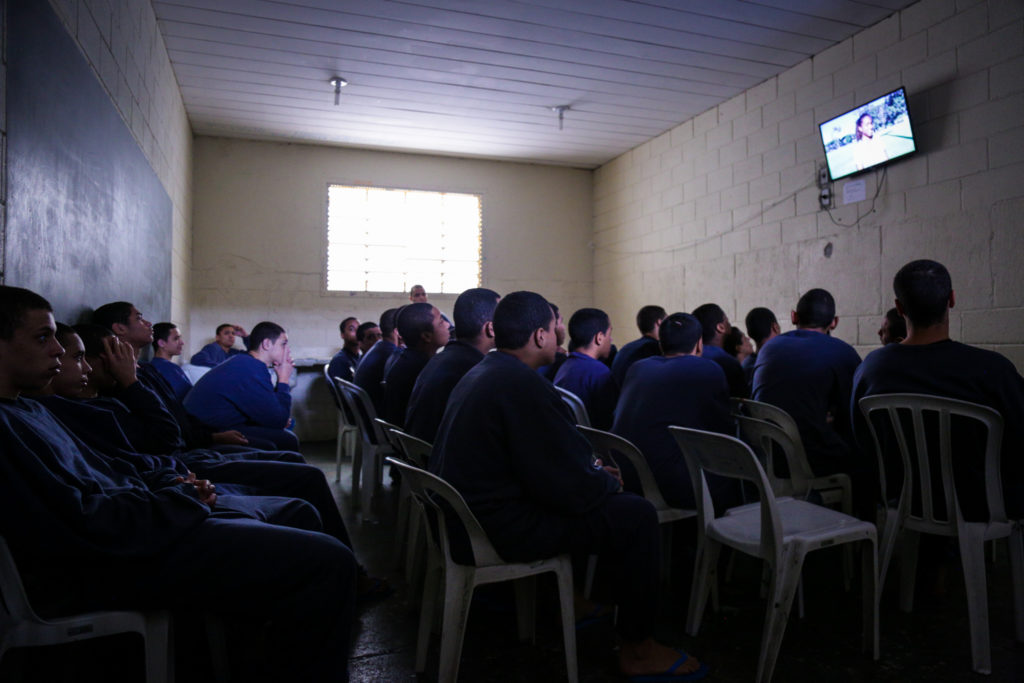Retrospective: human rights in times of pandemic
In 2020, Conectas was active in various areas that influenced the course of national politics and human rights. Take a look back at the most important moments in our retrospective

The year 2020 will be remembered in the history of mankind for the global health and economic crisis caused by the Covid-19 pandemic and for the urgent need to adapt to a new, more digital form of sociability.
In Brazil, this process acquired additional layers of complexity given the national political context. The government of President Jair Bolsonaro played down the risks of the pandemic, prioritized the economy at the expense of people’s lives, encouraged gatherings, clashed with state governors and endorsed the use of unscientifically proven medicines as miraculous solutions to fight the virus.
The result of this negligent and irresponsible management are the approximately 190,000 lives lost to Covid-19 so far, with the greatest impact on marginalized populations – blacks, the poor from the urban outskirts and indigenous peoples, among others – whose rights have been historically violated or denied.
Read more
It was the year when human rights organizations had to adapt their strategies to the reality of social distancing and work together to place limits on the conservative and authoritarian zeal of the Bolsonaro government.
Persistence was also a feature of the organization’s work in 2020. In addition to the challenging agenda caused or intensified by the pandemic, we continued our work to tackle persistent situations of abuse.
In this retrospective, we take a look back at the topics in which the work of Conectas made a difference in the protection of rights:
Suspension of police operations in Rio de Janeiro

Rio de Janeiro Military Police helicopter hovers over the Alemão favela complex in an
operation carried out in 2010 (Vladimir Platonov/ABr)
In May, the 14-year-old boy João Pedro Mattos was playing in his home in São Gonçalo when the Military Police raided the area in search of alleged drug dealers. João Pedro died from a bullet wound to the stomach. The case shocked the country, but it was just one of a number of violent raids carried out by the police in the middle of the pandemic in favelas and poor communities in the state of Rio de Janeiro.
As a result, a coalition of organizations – all of them amicus curiae in the “Favelas Case” (ADPF Case No. 635) – filed a petition in the Supreme Court to suspend all police operations in Rio de Janeiro for the duration of the Covid-19 health emergency. A week later, in a historic decision, Justice Edson Fachin granted the request, which was later upheld by a full session of the Court.
As part of this same Favelas Case, in August the Supreme Court placed new restrictions on Rio de Janeiro state’s public security policy, by banning the police from firing guns from armored helicopters and restricting police operations around schools and hospitals.
The reaction of indigenous peoples

A line of Yanomami people during a meeting of Yanomami and Yek´wana leaders, in November 2019. Photo: Victor Moriyama/ISA
The Covid-19 pandemic has exposed the vulnerabilities of Brazilian indigenous populations and the violations of their rights. A campaign led by the Yanomami and Ye’kwana peoples, with the support of several civil society organizations, including Conectas, called for the removal of more than 20,000 goldminers from their land. Called “Miners Out, Covid Out!”, the campaign ended in December with more than 439,000 signatures and an event in Brasília that illuminated the front of the National Congress building.
In addition to this public mobilization, the protection of indigenous people also made it to the Supreme Court. A full session of the court upheld an injunction granted by Justice Luís Roberto Barroso requiring the federal government to adopt urgent measures to contain the spread of the pandemic in indigenous territories. For the first time ever, the Supreme Court recognized APIB (Association of Indigenous Peoples of Brazil) as a representative organization entitled to file cases of unconstitutionality with the court. ADPF Case No. 709, in which Conectas was admitted as an amicus curie, asked the Judiciary to order the adoption of urgent measures to guarantee the protection of indigenous peoples during the pandemic. In an interview with Conectas, the legal adviser to APIB, Luiz Eloy Terena, explained the impact of the ruling.
The Supreme Court ruling was not the government’s only setback on indigenous issues. In July, the IACHR (Inter-American Commission on Human Rights) issued a resolution that granted precautionary measures for the protection of the Yanomami and Ye’kwana indigenous peoples. According to the IACHR, these populations are facing a serious situation and run the risk of irreparable damage.
Covid-19 in prisons

Having the world’s third largest prison population and overcrowding of more than 50%, Brazilian prisons are a source of concern for the uncontrolled spread of Covid-19. In March, a recommendation issued by the CNJ (National Justice Council) outlined a number of measures to contain the epidemic in the prison system, including a review of pre-trial detentions.
Over the course of the year, the disregard shown by the authorities for the health conditions of the prison population was cause for a series of actions by civil society. In March, the Criminal Justice Network, of which Conectas is part, outlined its recommendations for preventing the transmission of the novel coronavirus in Brazilian prisons, which included the reduction of pre-trial detention and the decarceration of people in risk groups.
In a joint statement, the CNPCT & MNPCT (National Committee & National Mechanism to Combat and Prevent Torture) and the CNDH (National Human Rights Council) expressed concern over the control of the pandemic in the prison system while more than 200 organizations around the country submitted to the UN and the OAS a complaint against Covid-19 management in Brazilian prisons.
Control and surveillance of NGOs

Headquarters of Abin (Brazilian Intelligence Agency) in Brasília. Photo: reproduction
In March, the government of President Jair Bolsonaro appointed an agent of ABIN (Brazilian Intelligence Agency) to head up the government department responsible for relations with NGOs. Because it is an intelligence agent, their identity cannot be revealed, which is why their appointment published in the Federal Gazette only contains their registration number. Conectas filed a lawsuit challenging the appointment and a Federal Court in São Paulo suspended the measure, forbidding the government from naming another ABIN agent to the position. The ruling was later overturned, but the agent was removed from the position and assigned another job. A report published recently by the Pública journalism agency revealed the identity of the agent and exposed how the federal government has been infiltrating intelligence agents into the public administration.
Discrimination on the borders

Pacaraima RR 23 08 2018 Grupo de imigrantes venezuelanos percorre a pé o trecho de 215 km entre as cidades de Pacaraima e Boa Vista.Marcelo Camargo/Ag. Brasil
In response to the pandemic caused by the novel coronavirus, in March the federal government decided to close the land borders and imposed an exceptional restriction on the entry of people from Venezuela. The decisions on the permission to enter the country began to be made through decrees published every 30 days, including on water and air access routes.
In June, the Federal Public Defender’s Office, the Federal Prosecutor’s Office, Cáritas São Paulo and Conectas filed a lawsuit challenging the discriminatory nature of the decree with regard to migrants in situations of vulnerability.
In response, a Federal Court in the state of Acre, in an interim decision, ordered the suspension of the decree banning the closure of the borders to migrants in situations of vulnerability. Nevertheless, asylum seekers were still prevented from entering Brazil. Weeks earlier, the government had reopened the air borders to tourists, but maintained the entry ban on asylum seekers. The interim decision was later overturned following an appeal by the federal government.
In December, a technical opinion by Cepedisa/USP (Center for Studies and Research on Health Law of the University of São Paulo), provided at the request of Conectas, showed that the closure of the borders has no legal or health grounding. The opinion was sent to Ministries and other federal agencies involved in the closure of the land and water borders.
Violations in Suape

Estaleiro Atlântico Sul, pertencente Porto de Suape, localizado na região metropolitana de Recife (PE).
After an assessment that lasted five years, the NCP (National Contact Point), an international body responsible for monitoring compliance with the guidelines of the OECD (Organization for Economic Cooperation and Development), completed its analysis on the violations committed by the multinational Van Oord against traditional communities in the region of Suape, on the southern coastline of the state of Pernambuco.
The NCP was based on a petition that identified several environmental impacts and violations committed against the original inhabitants of the area during the dredging of the Port of Suape. The petition was signed by the Z8 Fishing Colony, formed by families from the region of Gaibu, by the Suape Forum, a network of fishing and shellfishing associations, and by the civil society organizations Conectas and Both Ends.
The construction of the port began in the 1970s and led to the eviction of thousands of people who originally inhabited the area currently inside the industrial perimeter.
Custody hearings by video conference

Man detained after arrest is presented before a judge in a pre-trial custody hearing held on 07/01/2016 in the Criminal Courthouse of Barra Funda, in São Paulo
Five months after approving a resolution banning pre-trial custody hearings from being held by video conference for the duration of the coronavirus pandemic, as determined by the Brazilian Code of Criminal Procedure, the CNJ (National Justice Council) changed its interpretation and authorized the hearings to be held virtually.
The Council’s decision was given despite the opposition of more than 150 civil society organizations. Established in 2015, the custody hearing is a procedure that serves not only to assess the legality of the detention, but also for a judge to determine whether the detained person has been subjected to acts of torture or other types of degrading treatment during the police contact.
Attack on women’s rights

Ministers Damares Alves and Ernesto Araújo participate in virtual ceremony to announce the Geneva Consensus Declaration (Photo: Reproduction)
The governments of Brazil and the United States jointly sponsored an international declaration that, on the pretext of establishing basic principles on the issue of women’s health, proposed to reaffirm the rejection of abortion and the defense of the heteronormative family. Known as the Geneva Consensus Declaration, the document does not have the status of an international treaty and it was supported by few countries, primarily those that oppose women’s rights.
Months earlier, Brazil had abstained on setbacks to women’s rights presented through amendments by countries such as Russia, Egypt and Saudi Arabia during a vote in the UN Human Rights Council.
Domestically, the Bolsonaro administration has made it more difficult for women to access to legal abortions, even in cases of rape. A decree published in late August by the Ministry of Health established a series of bureaucracies for performing the procedure, such as a requirement for health care professionals to notify the police about cases of sexual violence. In an interview with Conectas, the lawyer Gabriela Rondon, co-director of Anis – Institute of Bioethics, said the measure makes a right that is already difficult to access practically unfeasible.
Doctors prevented from working during the pandemic

Médicos estrangeiros e brasileiros que se graduaram em outro país, fazem a segunda etapa da edição 2017 do Exame Nacional de Revalidação de Diplomas Médicos Expedidos por Instituições de Educação Superior Estrangeira (Revalida).Foto Fabio Rodrigues Pozzebom/Agência Brasil
Given the need for quick and urgent actions imposed by the pandemic, a number of countries, such as Canada and Germany, relaxed their laws to make it easier to hire doctors trained abroad.
In Brazil, despite the shortage of health care professionals in several regions with alarmingly high rates of infection, permission to work depended on a national examination that has not been held for three years. Initially scheduled for October, the examination was only held in December, despite appeals to the Ministry of Education by several organizations calling for the publication of the public notice announcing the examination to be brought forward.
Small-time trafficking is not a “heinous crime”

Another important court ruling occurred in September, when the 6th Chamber of the Superior Court of Justice – Brazil’s highest appellate court for non-constitutional matters – banned the São Paulo justice system from keeping in secure prison facilities people convicted of drug trafficking that meets the classification of “privileged trafficking” – i.e. first-time offenders with good records and no connections to criminal organizations.
In 2016, the Supreme Court recognized “privileged trafficking” as a petty crime. In his vote, the rapporteur of the case, Justice Rogerio Schietti Cruz cited a report produced by Conectas and IDDD (Defense of the Right to a Defense Institute) on how the São Paulo State Court systematically fails to comply with the Supreme Court’s ruling on privileged trafficking.
End of overcrowding in youth detention facilities

In August, the Second Chamber of the Supreme Court determined the end of overcrowding in units of the youth detention system across the country. In his vote, Justice Edson Fachin, the rapporteur of the case, suggested a number of alternatives to reduce overcrowding at facilities that are already operating over capacity, among them the adoption of a maximum number of people in each facility and the reassessment of cases of adolescents in custody for non-violent offenses, by scheduling hearings in the state courts.
The decision was taken based on a habeas corpus originally filed by the Espírito Santo State Public Defender’s Office in 2017. Afterwards, the Public Defender’s Offices of other states, such as Bahia, Ceará, Espírito Santo, Pernambuco and Rio de Janeiro, among others, joined the petition and so the Supreme Court decision was extended to include all states. Conectas is an amicus curiae in the case.
Environmental crisis and climate emergency

Speech by President Jair Bolsonaro, in a video sent to the United Nations (Photo: UN Photo/Rick Bajornas)
In his speech at the opening of the 75th UN General Assembly, President Jair Bolsonaro blamed civil society organizations for an alleged “disinformation campaign” against the country. Speaking to the international community, the president played down the seriousness of the fires that devastated parts of the Pantanal wetlands and Amazon rainforest.
Just days before, the Supreme Court had held a public hearing to discuss the Brazilian environmental crisis and its implications for combating the climate emergency. The hearing addressed the very lack of government policies to protect the environment, and in particular actions to combat deforestation.
In November, a coalition of 10 networks and civil society organizations filed a case in the Supreme Court calling for the effective resumption of PPCDAm (Action Plan for the Prevention and Control of Deforestation in the Amazon). The case presents comprehensive information with data and analysis on the destruction of the forest and the dismantling of environmental policies being undertaken by the Bolsonaro government.
Rights in the Pandemic

Given the urgency that the Covid-19 pandemic created in Brazil and around the world, in July Conectas and Cepedisa/USP (Center for Studies and Research on Health Law of the University of São Paulo) launched the Rights in the Pandemic Bulletin. The publication proposes to conduct comprehensive research into all the legal and sub-legal norms issued by government in Brazil, whether on the federal, state or municipal level.
The project is conducted by a multidisciplinary team and consists of documentary research to establish a database of norms, with the production of data for qualitative analysis of the potential impact on human rights, as well as the production of data for disaggregation and quantitative analysis, in particular cross-referencing data on the norms with epidemiological indicators.
Until December, there have been nine issues of the Bulletin, which can be accessed here.
“Cara Pessoa” podcast

In 2020, Conectas embarked into the world of podcasts. In partnership with the newspaper Folha de S.Paulo, the weekly program “Cara Pessoa” addressed the challenges of human rights and discussed their understanding and assimilation by society.
In 10 episodes, the podcast hosted by the journalist Fernanda Mena dealt with topics such as freedom of expression, racism and whiteness, police violence, the right to abortion, contemporary slavery and migration, among others. All the episodes are available on the main podcast platforms.
Donate to Conectas and strengthen our work
These were some of the most relevant human rights topics on which Conectas worked over the course of this difficult and turbulent year. Our work was only possible thanks to the support of donors who believe in our work and share our causes. Join us and be part of this change.






